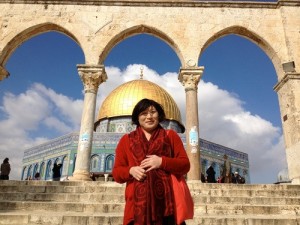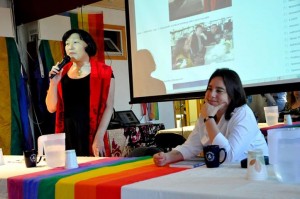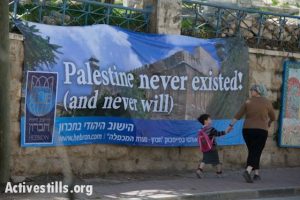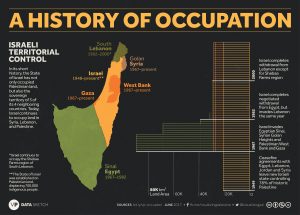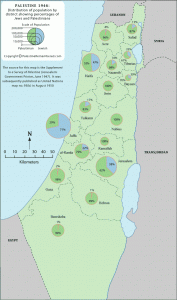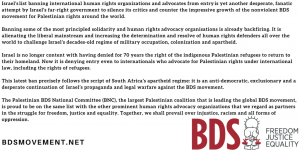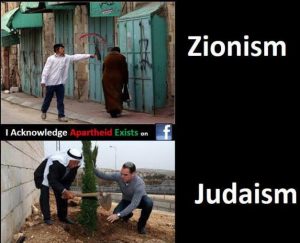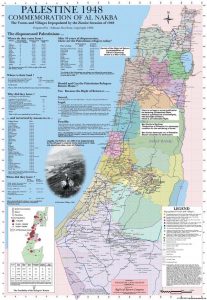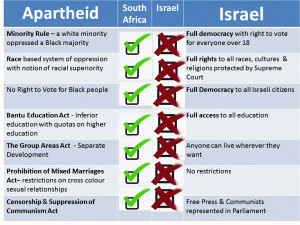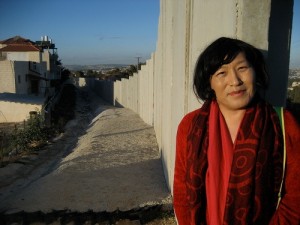Israel vs. Palestine: 10 key points about public discourse
by Pauline Park
1) ‘Israel’ vs. ‘Palestine.’ There are many ways of referring to the land between the Mediterranean and the Jordan River; perhaps the most value-neutral is ‘Israel/Palestine,’ which has the advantage of recognizing the reality that there is in fact now one state in control of this entire territory.
2) Israel’s ‘right to exist.’ This is one of the top talking points of the American Israel Public Affairs Committee (AIPAC) and the Israel lobby but in fact, it’s just propaganda; it’s not a question of whether Israel has a right to exist or not; no state has a ‘right to exist’; the concept is entirely foreign to international law. States exist; Israel exists; but no state has a right to exist. Zionists usually elide this ‘right to exist’ with the right to self-determination for nations and peoples, including the Jewish people, as well as the right of all individuals to ‘life, liberty and the pursuit of happiness’ (to use Thomas Jefferson’s famous formulation in the Declaration of Independence); but states are not nations and nations are not states, nor are states individuals or individuals states.
3) Israel as ‘the Jewish state’ vs. ‘Israeli Arabs.’ In July 2018, the Israeli Knesset enacted the ‘Nation-State Law,’ which downgrades the status of Arabic from official language (along with Hebrew) to one with only ‘special status’; more importantly, by declaring Jewish supremacy, the state of Israel has made its Palestinian citizens all but foreigners in their own land. Israeli politicians like to refer to these Palestinian citizens as ‘Israeli Arabs,’ but in fact, there is no such thing as an ‘Israeli Arab.’ 20% of the population within the internationally recognized borders of the state of Israel are Palestinian citizens of Israel who are the remnants of the indigenous people of Palestine who successfully evaded or resisted the ethnic cleansing of the Nakba (the ‘Catastrophe’ in Arabic) in which Zionist militias drove out over 750,000 Palestinians murdering tens of thousands (an exact count has never been determined). The Israeli government uses the term ‘Israeli Arab’ to erase the Palestinian identity of these Palestinian citizens of Israel and so using the term only helps advance that Zionist agenda. Significantly, Israel is the only state that makes an absolute distinction in law between ‘citizenship’ and ‘nationality’ (the two are usually coterminous in national law) and the ‘Nation-State Law’ has only further downgraded the debased ‘citizenship’ offered to Palestinian citizens of Israel into second-class citizenship, excluding them from ‘nationality,’ which is defined exclusively as ‘Jewish nationality,’ and which carries the most important privileges of Israeli citizenship; in this regard, Israel itself is an apartheid state even apart from the apartheid regime it has maintained since 1967 in the illegally occupied West Bank, East Jerusalem and the Gaza Strip.
4) ‘Palestine never existed.’ One of the biggest Zionist talking points is that there is no such thing as ‘Palestine’; in its strongest form, the assertion is that Palestine never existed and some Zionists even claim that use of the term ‘Palestine’ is inherently anti-Semitic; such assertions are of course absurd. ‘Palestine’ was the term used centuries before the Romans called the territory they made a province of the Roman Empire ‘Palaestina’ (or ‘Syria Palaestina’) between 135-390 ACE. Palestine conquered and reconquered by numerous states after the Byzantine Empire (the successor to the Roman Empire) collapsed and was actually divided into three provinces under Ottoman rule, which gave way to British Mandate Palestine. The real agenda behind the ‘Palestine never existed’ assertion is to make the claim that because there was never an independent state called ‘Palestine,’ there never should be; but by that logic, no state could ever be legitimate because no state existed before it actually existed.
5) The Israeli/Palestinian ‘conflict.’ The most common way that individuals, political leaders and the media refer to the ongoing conflict in the land between the river and the sea is ‘the Israeli/Palestinian conflict,’ sometimes ‘the Arab/Israeli conflict’ and sometimes simply as ‘the conflict’; none of these terms are helpful and in fact they are all misleading to a greater or lesser extent; it is much more accurate to refer to ‘the occupation,’ because the state of Israel has maintained an illegal military occupation over the occupied Palestinian territories (OPT) since seizing them from Jordan (the West Bank and East Jerusalem) and Egypt (the Gaza Strip) in the 1967 war.
6) The ‘disputed territories’ vs. the occupation. Zionists and Israeli government officials have been pushing the expression ‘disputed territories’ in the last several years to confuse and mislead people (especially Americans) into thinking that there’s some ‘dispute’ over whether the OPT are ‘occupied’ or not; in fact, there is no dispute in international law over the status of ‘the territories’ which have been subjected to an illegal foreign military occupation since 1967; only those who join the Israeli government and the Zionist machine in misleading the public will use the phrase ‘disputed territories.’
7) The ‘peace process’ and the ‘two-state solution.’ There is a specific ‘peace process’ specified in the Oslo Accords signed in Washington, D.C. in 1993 and in Taba (Egypt) in 1995 which the Israeli government has repeatedly violated; there is also a more general usage of ‘peace process’ that refers somewhat amorphously to ongoing attempts to resolve ‘the conflict.’ In any case, there is no question that the peace process specified in the Oslo Accords has reached a dead end (to put it generously); to put it more precisely, the Israeli government has used the ‘peace process’ of the Oslo Accords to try to gain international legitimacy for its illegal occupation and its illegal settlements in the West Bank and East Jerusalem while doing almost nothing to fulfill its obligations under the Oslo Accords. The important take-away from any examination of the ‘peace process’ is that the ‘two-state solution’ is now well and truly dead, despite that phraseology being official discourse in Washington, D.C., Jerusalem and Ramallah.
8) Zionism vs. Judaism and BDS vs. anti-Semitism. Israeli Prime Minister Benjamin Netanyahu and the Zionist machine have done their best to try to equate Israel with Judaism and Zionism with Judaism, but of course, neither is true: Judaism is a religion, Israel is a state and Zionism is a political ideology; and in fact, the majority of European Jews were anti-Zionist before the Holocaust and an increasing number of Jewish Americans are anti-Zionist today. While there are religious elements to what is misleadingly called ‘the conflict,’ the dispute is fundamentally about land, not religion. And there are many religious Jews in Israel itself as well as in North America and Europe who view the state of Israel as illegitimate for religious reasons. Netanyahu and AIPAC want to confuse Americans and Europeans into equating support for Jews and Judaism with support for Israel even though half the world’s Jews live outside of Israel and Jews in the Jewish diaspora do not get to vote in Israeli elections. Importantly, false charges of anti-Semitism that Zionists hurl against anti-apartheid activists trivialize and encourage real anti-Semitism. And parenthetically, Palestinians and other Arabs are also Semites. Zionist claims that the campaign for boycott, divestment and sanctions aimed at challenging Israel’s illegal occupation of Palestine is anti-Semitic are false because the call for BDS issued by Palestinian civil society is not directed against Jews or even against individual Israelis but rather against the illegal occupation and the state institutions that fund and maintain it. And it is the Israeli government itself that is trying to eliminate the distinction between products exported from the illegally occupied West Bank and East Jerusalem and those exported from Israel itself; by making it virtually impossible to determine if goods bearing a ‘made in Israel’ label are from Israel or from the OPT, the Israeli government has made an extension of BDS to Israel itself unavoidable and inevitable.
9) Israeli ethnic cleansing, apartheid and genocide. Zionists vehemently reject application of the terms ‘ethnic cleansing,’ ‘apartheid’ and ‘genocide’ to Israel’s behavior as well as the equation of Zionism itself with racism, but in fact, the very foundation of the state of Israel was based on the ethnic cleansing of over 750,000 indigenous Palestinians in the Nakba (‘Catastrophe,’ in Arabic) in 1948 that paved the way for the unilateral declaration of independence at the end of the British League of Nations Mandate in Palestine. And ‘apartheid’ and ‘genocide’ are both defined in international law, apartheid in the 1973 International Convention on the Suppression and Punishment of the Crime of Apartheid as well as in the 2002 Rome Statute of the International Criminal Court and genocide in the Convention on the Prevention and Punishment of the Crime of Genocide; under the terms of these legally binding and universally accepted international statutes and conventions, Israel is guilty of both the crime of apartheid in the West Bank and East Jerusalem and the crime of genocide in the Gaza Strip.
10) LGBT issues and the ‘pinkwashing’ of Israeli occupation and apartheid. In order to distract attention from these crimes, the Israeli government and its Zionist allies in North America, Europe and elsewhere have engaged in the ‘pinkwashing’ of Israeli occupation and apartheid, the attempt to tout Israel’s record on lesbian, gay, bisexual and transgender (LGBT) issues; but contrary to Zionist descriptions of Israel as a gay paradise, its actual record on LGBT issues is a mixed bag, as the ban on gay men using surrogacy enacted by the Knesset in July 2018 shows; and significantly, while the Israeli government and the Zionist machine are at pains to compare Israel’s record on LGBT issues with that of neighboring Arab states, they never compare Israel’s record on LGBT issues with that of European states such as the Netherlands, Belgium, Spain or the Nordic countries, all of which recognize same-sex marriage; in fact, Ireland actually enacted marriage equality via referendum.
Pauline Park is the chair of the New York Association for Gender Rights Advocacy (NYAGRA) and a co-founding member of New York City Queers Against Israeli Apartheid (NYC QAIA); she led the campaign for the transgender rights law enacted by the New York City Council in 2002 and in 2005 became the first openly transgendered grand marshal in the history of the New York City LGBT Pride March; she participated in the first US LGBTQ delegation tour of Palestine in January 2012; she has a Ph.D. in political science from the University of Illinois at Urbana-Champaign. The opinions expressed here are those of the author and not necessarily of any group or organization with which she is associated.
